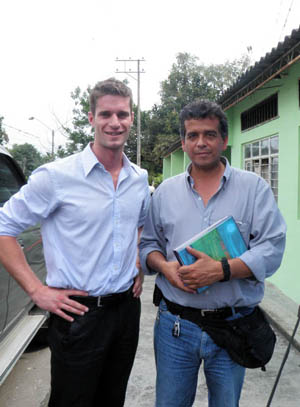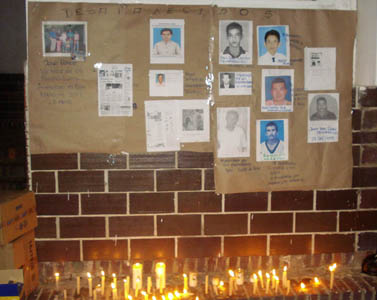McCarthy Tétrault LLP associates George Gray and Marie-Pierre Grenier spent last week in Colombia working with Lawyers Without Borders/Avocats sans Frontières Canada. Here they share some of their reflections from the experience.
Our mission was to observe the work conditions of Colombian human rights lawyers. We also had the opportunity to meet and listen to human rights defenders, members of indigenous communities, members of the police and armed forces, victims of human rights violations, and internally displaced people.
It turns out that it was a propitious time to visit.
We arrived in Bogota with 50 lawyers from around the world on Aug. 19. Juan Manuel Santos, former defence minister, had just taken office as president. He has inherited the popularity and so-called Democratic Security policies of his predecessor Alvaro Uribe, along with the government’s bleak human rights record and related scandals.
George
 I jumped at the chance to join Lawyers Without Borders Canada in Colombia. I had last visited the country as a tourist, during a post-articling trip through its mountains, beaches, and salsa bars. I had great memories of its stunning geographic beauty, its friendly and outgoing people, and its apparent progress from years of violent drug wars.
I jumped at the chance to join Lawyers Without Borders Canada in Colombia. I had last visited the country as a tourist, during a post-articling trip through its mountains, beaches, and salsa bars. I had great memories of its stunning geographic beauty, its friendly and outgoing people, and its apparent progress from years of violent drug wars. This time, after a briefing on our project, I joined two other caravanistas on a visit to the Cauca Region, a rural and mountainous province in the southwest of the country.
Our first stop was Popayan, a gorgeous agricultural centre with legally mandated white stucco walls and red-tiled roofs. The peaceful colonial image of Popayan sadly belies the daily horrific violence on its streets. For 1.5 days, farmers, lawyers, and human rights workers streamed into our hotel to tell us their stories of casual and brutal violence. Each person testified to the complicity of the state and the impunity of the perpetrators.
Families of murder and kidnapping victims clearly lack recourse in a society where the military and police share a widespread paranoia that each poverty-stricken farmer or human rights worker is also a leftist guerrilla. An uncomfortable military presence around our hotel underscored the seriousness of the situation, as did reports that police photographed each person entering and leaving our meetings.
I woke up the next morning still reeling from the stories I had heard. During a quick walk around the town, I came across 50 refugees in line to register for assignment to a ghetto just outside of town. This group of men, women, and children had just arrived, with all their possessions, from the countryside. They are among Colombia’s estimated four million displaced people.
The next town we visited was smaller, and populated mostly by indigenous people. It was even more steeped in violence. Men, women, and children patiently waited to tell us their brutal stories of kidnapping, torture, and murder, showing their machete, gun, and grenade wounds as proof. They felt hopeless: the authorities offered no help, were complicit, or were outright perpetrators.
Before embarking on this trip, I had been enthusiastic but somewhat doubtful. What could we as gringo lawyers really accomplish during a weeklong visit?
I now realize I was underestimating the gravity of the situation in Colombia and the significance of observation by a third party. It has been said there must be observation before there can be history. The ongoing, serious, and widespread violence in Colombia has not entered the realm of its official history because it has not been observed by internationally credible witnesses. While Colombian authorities have been quick to dismiss local human rights advocates as guerrilla sympathizers, it is more difficult to do so with visiting lawyers.
We will summarize our observations in a report that we hope will provide a reach and an impact beyond what the stigmatized local lawyers can accomplish.
This trip has made the importance of our profession real to me. I’ve always known on some level that lawyers play an important role in society. Now that I have seen the tragedy and hopelessness of society with a legal system as broken as Colombia’s, I have a new appreciation for the significance and responsibility of our jobs.
It was a privilege to be able to help the practice and accessibility of law in a society that lacks both — a privilege I hope to experience again in the future.
Marie-Pierre
 I’d been to Colombia before, as a tourist and as an intern for the Canadian Bar Association. I was eager to return to a country that has a bad reputation but, more importantly, a vibrant culture, fabulously welcoming people, and the sound of music everywhere.
I’d been to Colombia before, as a tourist and as an intern for the Canadian Bar Association. I was eager to return to a country that has a bad reputation but, more importantly, a vibrant culture, fabulously welcoming people, and the sound of music everywhere. After diligently reviewing the Spanish vocabulary list we were given of words such as presos politicos (political prisoners), chuzadas (wiretapping), and seÃÆ’±alamientos (baseless accusations), I anticipated an engaging and meaningful trip.
The city Cucuta, capital of Norte de Santander, has little to offer the usual tourist. It’s dusty, terribly hot, and poor. The region borders Venezuela and is home to important natural resources such as coal and fertile lands. Sadly, it is plagued with violence, drug and other trafficking, profound social divisions, and civil strife that have left thousands dead. The conflict raging in the surrounding countryside has forced displaced farmers to flock to the so-called cinturÃÆ’³n de miseria (misery belt) at Cucuta’s outskirts.
Along with nine caravanistas, I spent my first four days meeting with victims and associations for the defence of peasant farmers and victims. These included the Association of Peasant Farmers of Catatumbo and the National Movement of Victims of State Crimes.
We listened to displaced farmers, family members of desaparecidos (victims of forced disappearance), and members of the civil society who had suffered violent acts perpetrated by members of the armed forces, demobilized paramilitaries, and other armed groups.
We also heard from lawyers living under constant threat. They explained that confusion between a lawyer and the client he defends is common in Colombia. Lawyers often pay with their lives for their involvement in a case.
We then embarked on meetings with judges, personeros (local ombudsmen for small municipalities), and representatives of the military.
We observed that government representatives and members of the civil society seem to live in two different worlds.
On the one hand, government representatives and members of the armed forces blame human rights violations and the global security situation on the guerrilla, narcos, and other “illegal armed groups”; they are somewhat reluctant to acknowledge the presence of paramilitaries, which have been officially demobilized.
On the other hand, members of civil society complain of being harassed by demobilized paramilitary groups and denied justice by state officials. To compound their challenges, the legal system’s complete lack of resources results in due process shortcomings, insufficient protection of witnesses and victims, insufficient capacity to deal with a huge caseload, and an apparently all-encompassing impunity for crimes committed by the state and armed groups.
We then took our observations to the capital; we had a very interesting meeting in Bogota with the vice president of Colombia, Angelino GarzÃÆ’³n. It certainly reminded me that the young lawyer I am still has a lot to learn about the politics of human rights advocacy.
Once we return to Canada, we will put our recommendations into a group report. We hope they will remind our politicians, fellow lawyers, and business people that gross human rights violations still affect the daily lives of many Colombians.
George Gray is an associate from McCarthy Tétrault LLP’s Toronto office and Marie-Pierre Grenier is an associate with the firm’s Quebec City office.







